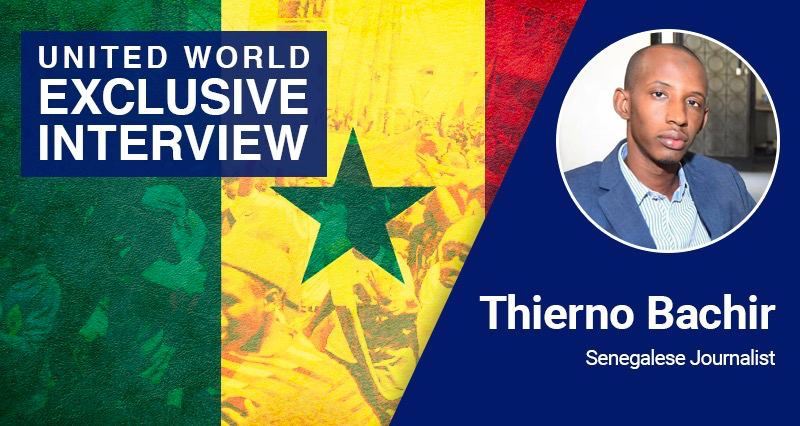Bassirou Diomaye Faye won the presidential elections held in Senegal on March 24 in the first round. Faye received 54.2% of the vote, while the candidate of the governing coalition, Amadou Ba, received 35.7%.
The opposition candidate, Ousmane Sonko, was jailed before the elections and lost his right to run. It was announced that his right-hand man Diomaye Faye would run in his place, but Faye was also arrested.
Faye and Sonko, who were in detention when the election process began, were released on March 14, 10 days before the election, benefiting from a political amnesty.
Elected President at the age of 44, Faye became Africa’s youngest elected president.
We asked Senegalese Journalist Thierno Bachir about the election results in Senegal and their possible impact on Senegal’s foreign policy.
The new President of Senegal, Bassirou Diomaye Faye, has been sworn in and taken office. What are the new president’s political leanings in terms of foreign policy?
It is important to note that Senegal’s foreign policy is guided by a combination of factors, including national interests, regional and international alliances, and national priorities.
The President has been strict in his speeches, making it clear that he will reconsider the nature of Senegal’s relations with friendly countries, notably the former colonizer, France.
We can therefore confirm the determination of the new authorities to work on reorganizing the political documents linked to foreign relations, given that they won a certain number of votes from voters on the basis of political discourse that calls for the creation of a foreign policy based on preserving interests. And he also seeks to explore new opportunities and alliances based on international and regional circumstances.
An anti-French political wave is rising in Africa, particularly in Mali, Niger and Burkina Faso… Can the results of the elections in Senegal be assessed as part of this political wave in Africa?
The evolution of anti-French politics in certain African countries, such as Mali, Niger and Burkina Faso, could potentially have an impact on elections in Senegal.
It’s important to note that Senegal is a country that has links with these countries, but it’s a country that has its own intimacy when it comes to dealing with political issues.
I believe that this phenomenon has an impact, but not a strong one, on voter orientation, as there are internal challenges that are mainly influenced by national factors such as governance, the economy, justice and social issues.
Notwithstanding, anti-French rhetoric was present during election campaigns and also in youth movements that worked to reinforce this rhetoric, we have seen how French companies were targeted during political tensions in the country.
What steps will Senegal take to become fully economically independent? Is the exit from the CFA Franc the order of the day?
Senegal could take steps to become fully economically independent; these could include diversifying the economy, strengthening key sectors such as agriculture, industry and tourism, and promoting entrepreneurship and innovation…
And also, as you know, we will start exploiting natural gas and oil resources by next year, what is considered an important milestone for the success of the economic policy. The new authorities have announced their willingness to work in this area so that the state is able to manage its natural resources without recourse to others, and there will also be transparency in the management of these resources.
As for the CFA Franc currency, it’s a controversial subject because the leaders of the new power don’t have a unified position. At the beginning, they had a vision of getting out of the currency because some think it affects the sovereignty of the state. But I don’t think the new government will venture to that point, because an exit from the Regional Monetary Organization would have negative effects on the national economy.
It is therefore expected that the government will work with member states to implement appropriate monetary reforms and strengthen them so that state sovereignty is respected.
The world is moving towards a multipolar path. Western influence is waning. How is the African continent as a whole affected by this change?
As you have noticed, the African continent has begun to take a different path than before: it has recently discovered that it is possible to face all internal challenges and resolve crises without waiting for contributions from external partners.
These were initiatives resulting from genuinely African efforts to resolve African crises.
With the transformations taking place in the world, Africa has taken on a different perspective and a different vision of the nature of relations with the great powers: these are now equal relations based on full respect and the exchange of interests.
The African continent, like the rest of the world, is affected by the shift towards a multipolar path and the diminishing influence of the West. This can offer new opportunities for African countries to diversify their partnerships and alliances, both economically and politically. However, it can also present challenges, notably in terms of increased competition between global powers for access to African resources and markets.
How would you assess relations between Türkiye and Senegal? In what areas can Turkey and Senegal expand their cooperation?
Relations between Türkiye and Senegal are generally friendly and have strengthened in recent years, with high-level visits and cooperation agreements signed in various fields such as education, health, agriculture and infrastructure. The two countries could expand their cooperation in areas such as trade, investment, tourism and security, by exploiting mutual opportunities and strengthening their economic ties. We can affirm that Senegalese-Turkish relations will experience great development at all levels.
The Senegalese authorities have demonstrated their desire for fruitful cooperation with Türkiye, and they will strengthen their relations and seek to benefit from Turkish experience.
Türkiye has greatly contributed to the success of Senegal’s biggest projects, particularly those represented in infrastructure. There are agreements on visions in international and bilateral political positions.
















Leave a Reply